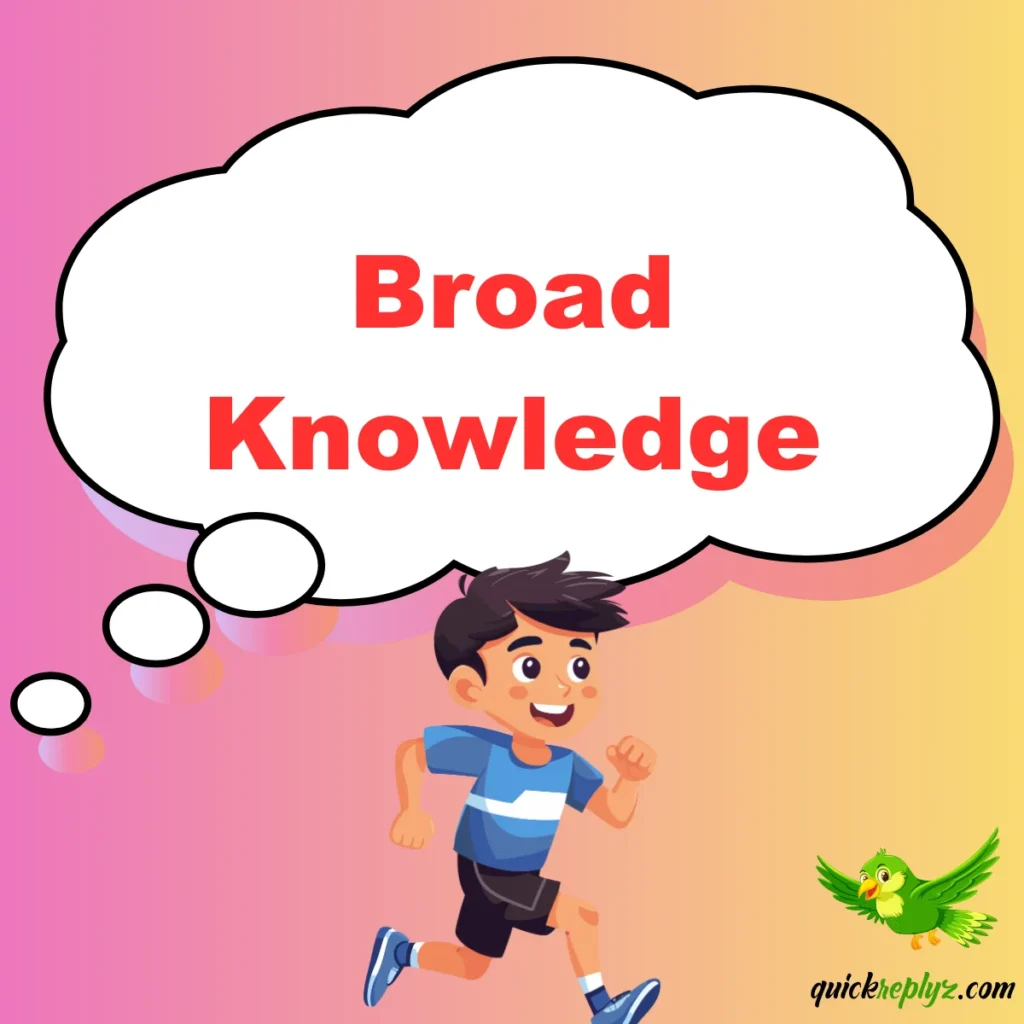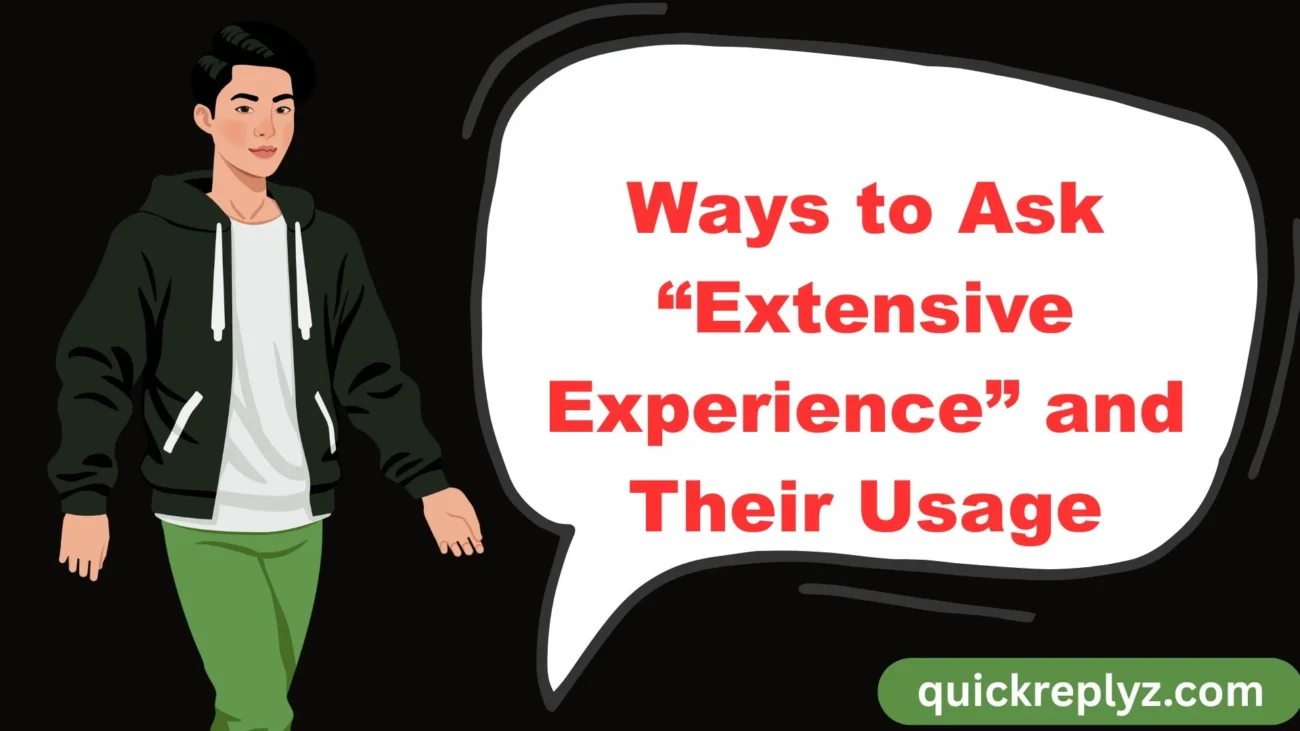When you’re writing a resume, LinkedIn profile, or professional email, the phrase “extensive experience” often feels overused. Recruiters and hiring managers want to see variety in language that highlights your skills, expertise, and achievements without sounding repetitive. That’s why knowing 30 alternative ways to ask or express ‘extensive experience’ can make your profile stand out, improve clarity, and show confidence in your abilities.
Another or Professional Nicer Ways to Say “Extensive Experience”
- Proven Track Record
- Strong Background
- Solid Foundation
- Deep Expertise
- Broad Knowledge
- Comprehensive Experience
- Wide-Ranging Expertise
- Substantial Experience
- Diverse Experience
- Extensive Knowledge
- Hands-On Experience
- Significant Experience
- Vast Experience
- Considerable Experience
- Extensive Background
- Rich Experience
- In-Depth Knowledge
- Longstanding Experience
- Impressive Track Record
- Extensive Skills
- Strong Expertise
- Career-Long Experience
- Decades of Experience
- Industry Expertise
- Strong Credentials
- Relevant Experience
- Professional Background
- Thorough Experience
- Established Expertise
- Extensive Professional Journey
1. Proven Track Record
A hiring manager once asked a candidate why she was perfect for a senior marketing role. Instead of repeating “extensive experience,” she said she had a proven track record in building campaigns that generated millions in revenue. This phrasing gave her credibility and confidence.
Example: “I have a proven track record of increasing customer engagement through strategic campaigns.”
Best Use: Perfect for resumes, cover letters, and LinkedIn profiles.
2. Strong Background
During an interview, a software engineer explained he had a strong background in developing scalable systems. This simple shift highlighted his depth of knowledge without sounding cliché.
Example: “She has a strong background in data analysis and reporting.”
Best Use: Use in resumes and networking conversations.
3. Solid Foundation
A teacher applying for an educational leadership role described her solid foundation in pedagogy and curriculum design, which gave her credibility for a promotion.
Example: “My solid foundation in teaching strategies has allowed me to mentor younger educators.”
Best Use: Suitable for job applications and recommendation letters.
4. Deep Expertise
When pitching to investors, an entrepreneur highlighted his deep expertise in AI technologies, which instantly boosted his authority in the room.
Example: “Our team brings deep expertise in AI-driven customer solutions.”
Best Use: Perfect for professional bios and presentations.
5. Broad Knowledge

Instead of saying “extensive experience,” a content strategist explained she had broad knowledge of SEO, storytelling, and branding, showing versatility.
Example: “He holds broad knowledge in finance, marketing, and operations.”
Best Use: Great for resumes and professional summaries.
6. Comprehensive Experience
An HR manager wanted to emphasize her all-rounded career. She explained her comprehensive experience across recruitment, training, and employee relations.
Example: “With comprehensive experience in HR, I can manage diverse workforce needs.” Best Use: Effective in cover letters and formal bios.
7. Wide-Ranging Expertise
In a project proposal, a consultant wrote that his wide-ranging expertise in business transformation would guarantee success. It caught the client’s attention.
Example: “Our wide-ranging expertise covers digital, strategy, and compliance.”
Best Use: Ideal for corporate websites and consulting pitches.
8. Substantial Experience
A project manager used the phrase substantial experience to show her seniority and leadership in managing multimillion-dollar projects.
Example: “I bring substantial experience in leading cross-functional teams.”
Best Use: Useful in resumes and performance reviews.
9. Diverse Experience
An MBA graduate explained he had diverse experience across marketing, sales, and finance, making him adaptable to multiple industries.
Example: “Her diverse experience enables her to handle complex challenges.”
Best Use: Excellent for interviews and networking.
10. Extensive Knowledge
A cybersecurity professional preferred the phrase extensive knowledge to highlight his technical skills in preventing cyber threats.
Example: “I have extensive knowledge of cloud security and data protection.”
Best Use: Perfect for technical resumes and certifications.
11. Hands-On Experience
During training, a candidate stood out by emphasizing his hands-on experience with real-world problem-solving instead of just theory.
Example: “I gained hands-on experience managing logistics during peak demand.”
Best Use: Best for early career professionals and portfolios.
12. Significant Experience
An NGO director used significant experience to highlight her role in humanitarian projects across multiple countries.
Example: “With significant experience in relief work, I can manage global operations.”
Best Use: Nonprofit and leadership resumes.
13. Vast Experience
A seasoned consultant spoke about his vast experience advising Fortune 500 companies. It positioned him as a trusted leader.
Example: “I bring vast experience in international trade and negotiations.”
Best Use: Executive bios and thought-leadership articles.
14. Considerable Experience
A lawyer pitching for partnership emphasized her considerable experience handling corporate mergers.
Example: “He has considerable experience in high-stakes litigation.”
Best Use: Use in resumes and legal profiles.
15. Extensive Background

An engineer applying for an R&D role explained his extensive background in product design and testing, building trust with employers.
Example: “My extensive background in engineering supports innovation.”
Best Use: Great for career summaries and technical proposals.
16. Rich Experience
A CEO explained her rich experience in scaling startups from scratch, making her appealing to investors.
Example: “She brings rich experience in venture building and entrepreneurship.”
Best Use: Good for executive bios and startup pitches.
17. In-Depth Knowledge
A finance analyst presented his in-depth knowledge of market trends during a board meeting, earning recognition for his insights.
Example: “In-depth knowledge of taxation allows me to optimize strategies.”
Best Use: Professional reports and resumes.
18. Longstanding Experience
A civil engineer described his longstanding experience in infrastructure development, which showed reliability and longevity.
Example: “He has longstanding experience in urban development.”
Best Use: Best for senior resumes and leadership roles.
19. Impressive Track Record
A digital marketer preferred “impressive track record” to demonstrate her success rate with campaigns.
Example: “Her impressive track record shows consistent growth in clients’ sales.”
Best Use: Case studies and cover letters.
20. Extensive Skills
Instead of saying “experience,” a designer highlighted his extensive skills across UI/UX design, motion graphics, and prototyping.
Example: “I bring extensive skills in both design and user research.”
Best Use: Portfolios and resumes.
21. Strong Expertise
A consultant introduced herself as someone with strong expertise in business process optimization.
Example: “He has strong expertise in project governance and compliance.”
Best Use: Consulting proposals and LinkedIn.
22. Career-Long Experience
An IT director shared her career-long experience in managing enterprise systems, showing depth of dedication.
Example: “With career-long experience, I understand technology shifts deeply.”
Best Use: Senior-level applications.
Also Read This: 30 Best Responses Ways to Ask Someone “What Are We?”
23. Decades of Experience
A doctor used decades of experience to reassure patients of his reliability and care.
Example: “With decades of experience, I provide trusted medical advice.”
Best Use: Healthcare, law, and executive profiles.
24. Industry Expertise
An entrepreneur pitched investors using the term industry expertise, making his knowledge domain-specific.
Example: “Our industry expertise lies in renewable energy solutions.”
Best Use: Business presentations and B2B marketing.
25. Strong Credentials
A professor described her strong credentials in research and teaching when applying for tenure.
Example: “His strong credentials include multiple peer-reviewed publications.”
Best Use: Academic resumes and bios.
26. Relevant Experience
A candidate stood out by highlighting relevant experience instead of repeating “extensive experience,” tailoring it to the job.
Example: “I have relevant experience in managing digital campaigns.”
Best Use: Job applications and interviews.
27. Professional Background
A coach used the phrase professional background to describe her history of working with Fortune 100 executives.
Example: “My professional background includes leadership coaching at top firms.”
Best Use: Executive bios and cover letters.
28. Thorough Experience
A researcher explained his thorough experience in data collection and analysis, emphasizing precision.
Example: “She has thorough experience in statistical analysis.”
Best Use: Research resumes and academic writing.
29. Established Expertise
An architect presented her established expertise in sustainable design during a conference.
Example: “With established expertise, I deliver eco-friendly urban projects.”
Best Use: Industry conferences and bios.
30. Extensive Professional Journey
An author described her career as an extensive professional journey, showing both growth and experience.
Example: “My extensive professional journey has shaped me into a versatile writer.”
Best Use: Personal branding and bios.
Conclusion
Using the phrase “extensive experience” repeatedly can make your professional writing sound flat. By replacing it with these 30 powerful alternatives, you can demonstrate authority, variety, and adaptability while impressing recruiters, clients, or employers. Each phrase adds a unique tone that makes your resume, LinkedIn profile, or pitch more persuasive.
FAQs
Q1. Why should I avoid repeating “extensive experience”?
Because it sounds generic and overused, which reduces impact.
Q2. What’s the best alternative for executive roles?
Phrases like “proven track record,” “vast experience,” and “decades of experience.”
Q3. Can I use multiple alternatives in one resume?
Yes, but spread them naturally across different sections.
Q4. Do these alternatives work for LinkedIn?
Absolutely. They enhance search visibility and engage recruiters.
Q5. How do I choose the right phrase?
Match it with the role you’re applying for—technical roles need “in-depth knowledge”, while leadership roles suit “strong background” or “impressive track record.”
Kayla Foster is a creative contributor at QuickReplyz.com who enjoys helping people express their thoughts effortlessly. She writes ready-to-use replies, messages, and captions that save time and improve communication. Her content is simple, useful, and tailored for real-life situations.

